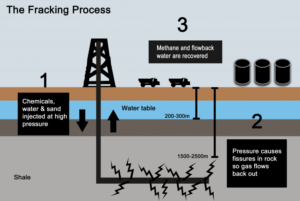Back to Fracking
 I wrote about fracking before, but it seems to be the time to revisit the controversy. The oil and gas business is paying for a media blitz saying fracking is a good thing: lower energy prices.
I wrote about fracking before, but it seems to be the time to revisit the controversy. The oil and gas business is paying for a media blitz saying fracking is a good thing: lower energy prices.
The opposition seems to believe fracking has concentrated all the evil in the world into a bunch of holes in the ground. What is the reality here? Both sides have strong arguments, but they are operating from separate assumptions.
Pro fracking advocates use the arguments that lower energy prices and tax revenue benefit us all. Anti fracking advocates point to many accidents at drilling sites and groundwater contamination, along with drilling steadily encroaching on urban ares as a dangerous activity.
What about the benefits of fracking? It’s true fracking has lowered energy costs and the conversion of coal fired power plants to has has lowered air pollution. True on both counts. But, fossil fuel is still being burned and greenhouse gasses are still going into the atmosphere. It’s very possible fracking and increased low cost gas production is impeding the process of converting to alternative energy sources.
What about fracking itself? It is not new technology. My Fruita paper route doubled during the 1950’s energy boom in Western Colorado and Eastern Utah. Fracking was part of the story then. The real change is to horizontal drilling combined with fracking.
A deep vertical hole is drilled and then the bore hole is turned ninety degrees over the distance of a quarter mile. The long horizontal bore is is perforated, explosive charges are detonated, fracturing rock usually fairly impervious to oil and gas flow. The openings are then injected with water and sand, cracking more rock with the cracks held open by the sand. Oil and gas can then flow into the bore hole and to the surface, then to your furnace and gas tank.
The fracking process uses a lot of water, from one to five million gallons. About half or less of the water returns to the surface and is most often injected into another well (cheaper than treatment). The water use can have a significant impact in arid regions. Return water can be treated, but is expensive.
Probably the biggest objection to fracking is groundwater contamination. Near Parachute CO, it was possible to light tap water on fire, there was so much gas in the water. Most often the contamination comes from leaks in the vertical bore hole. Proper casing and concrete injection readily prevents leaks, but as the work is done deep underground, it is easy to cheat, causing leaks.
My take on the issue? Increased production from fracking lowers oil and gas prices and decreases our reliance on imported oil. Coal fired power plants are being converted to gas, resulting in less greenhouse gas pollution from them. Done properly, the technology is safe, but cheating seems to be the norm in the oil and gas business. If we want to use fossil fuel, well regulated fracking is the way to go. i think some of the opposition is because of the word fracking. It seems to have an obscene connotation.
The big downside stems from the fact reduced fossil fuel costs are delaying the transition to alternative energy sources. One estimate points out that cheap natural gas makes gas fired power plant power cheaper than wind or solar power. The transition to alternative power may be slowed by twenty years or more. In the short run, cheap gas is good. In the long run, cheap gas may do more harm than good. The planet can’t sequester enough carbon and the planet gets warmer. Of course in the long run, we’re all dead.
The debate becomes political, and the oil business has the dollars to influence the decision. Result, more gas gets burned and the long run comes earlier. We will probably render our species extinct.